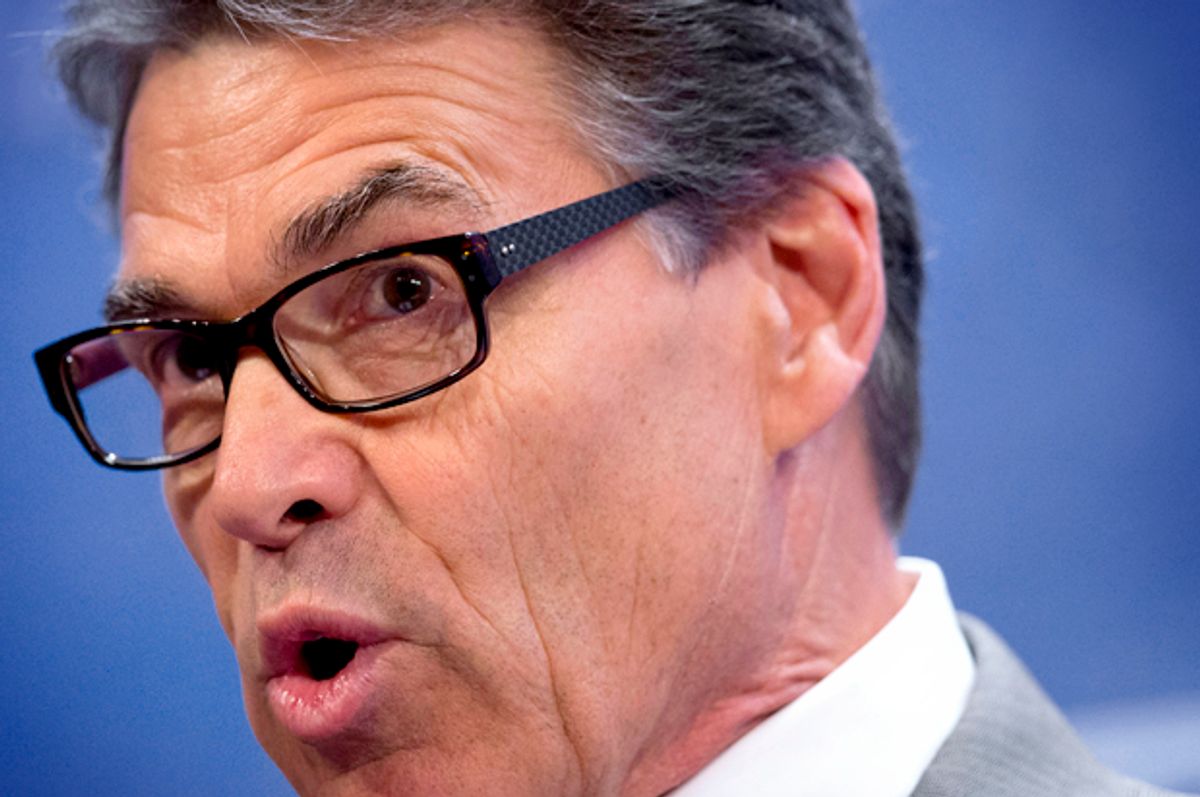Rick Perry doesn’t stand much chance of becoming the Republican nominee for president, let alone actually winning the White House, but his entrance into the 2016 race last week actually came at an opportune moment. Perry, as the long-serving former Republican governor of Texas, lays claim to one of the grimmest records in American history: he’s presided over more executions than any other governor. In the ten years Perry led the state, 278 prisoners were put to death, a fact Perry is obviously proud of. “If you come into our state and you kill one of our children,” Perry said during a 2011 primary debate, “you kill a police officer, you’re involved with another crime and you kill one of our citizens, you will face the ultimate justice in the state of Texas, and that is you will be executed.”
Perry’s record on capital punishment is controversial enough when viewed in isolation – he’s presided over the executions of the mentally incompetent and there’s mounting evidence that Perry put an innocent man to death (and moved to squash after-the-fact inquiries into the case). But now the most executing-est governor in American history has become a candidate for president at a time when the death penalty has come under harsh national scrutiny.
The day Perry declared his candidacy also saw the official exoneration of Henry Lee McCollum by North Carolina Gov. Pat McCrory. McCollum and his half-brother, who are both mentally disabled, were convicted of the 1983 murder of an 11-year-old girl and sentenced to death. The case against them was weak and based on coerced confessions, and the two men were released from prison last year after DNA evidence implicated another man in the crime. Despite the weakness of the evidence used to convict McCollum, he became a mascot for conservatives who argued in favor of capital punishment. As Steve Benen noted, McCollum’s case and the brutal particulars of the crime he was alleged to have committed were cited by Supreme Court justice Antonin Scalia in a 1994 ruling as a textbook example of why the death penalty was justified and necessary.
More significantly, late last month the Republican-dominated Nebraska state legislature voted to end the death penalty in the state, and then overrode the veto of the state’s Republican governor, Pete Ricketts. In a move that’s guaranteed to stir up further controversy, Ricketts is threatening to defy the legislature and carry out death sentences for the state’s remaining death row prisoners using lethal injection drugs obtained through legally dubious channels. Nebraska’s action is in keeping with a nationwide decline in executions as states ban capital punishment, budget-conscious prosecutors decline to pursue death sentences in favor of (less expensive) life terms, and lethal injection drugs become more difficult to obtain.
Those same drugs are at the center of a case currently before the Supreme Court, which is reviewing the constitutionality of lethal injection procedures in the wake of a series of gruesome “botched” executions in the past year.
All this, in combination with Perry’s candidacy, should spark a death penalty debate in the 2016 race. On the Republican side, you’re not going to find too many candidates willing to criticize Perry specifically or capital punishment generally. Jeb Bush, as governor of Florida, presided over 21 executions and resisted appeals from Catholic bishops to abandon or reform the state’s capital punishment procedures. John Kasich, the governor of Ohio, said in the wake of the Nebraska decision that “I support the death penalty and will continue to do that, because a lot of times, families want closure when they see justice done.” Chris Christie pursued the death penalty as a U.S. attorney and reportedly backed a 2011 bill to reinstate capital punishment in New Jersey. On the other hand, Rand Paul says he is “distrustful of so much power being given to government to kill somebody, when there might be a mistake,” though he begs off taking a position on abolishing capital punishment, saying “it isn’t a big issue” at the federal level and should left to the states to figure out.
On the Democratic side, however, there’s potential for a real fight. Hillary Clinton has been largely silent on the death penalty since she first ran for the Senate and described herself as having “unenthusiastic support” for capital punishment. The first big policy speech Hillary delivered as a 2016 candidate was about making reforms to the criminal justice system, but she made no mention of the death penalty in her remarks. While Clinton has been quiet on the issue, her opponents can point to their own records to draw contrasts with her. Former Maryland governor Martin O’Malley signed legislation to end the death penalty in his state in 2013. “Capital punishment is not a deterrent,” he wrote at the time, “it is not fool-proof, it is administered with great racial disparity, it costs three times as much as life without parole, and there is no way to reverse a mistake when an innocent person is wrongly convicted.” Bernie Sanders is also on record opposing capital punishment.
Again, there's little threat of Rick Perry becoming president and no reason to expect too much from his second run for the White House. But if his candidacy and his record as the nation’s most prolific executioner can help stoke a serious debate about the increasingly controversial application of capital punishment in the United States, at least it will have been good for something.



Shares